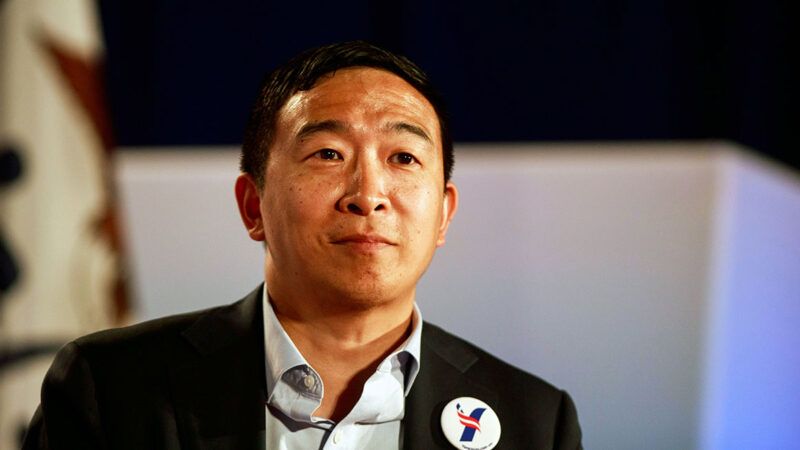Andrew Yang Is Still Trying To Move Forward
"We need to break up the duopoly, and the mechanical way to break up the duopoly is by shifting to open primaries and ranked choice votings so that every perspective has a shot."

For a politician who's never won anything, Andrew Yang is pretty famous. Yang's 2020 presidential campaign failed to earn any delegates to the Democratic National Convention after getting about 5 percent in the Iowa caucuses and 3 percent in the New Hampshire primary. He came in fourth in New York City's 2021 ranked choice Democratic primary for mayor. Despite his political struggles, Yang is now launching a new political party, the Forward Party.
While Yang and the Forward Party aren't libertarian, there are several planks of interest in their platform. It includes not just the universal basic income (UBI) proposal that made Yang famous but also ranked choice voting, nonpartisan primaries, and efforts to make the government more transparent and accessible.
In October, Reason's Nick Gillespie spoke with Yang about the Forward Party, the libertarian pitch for a UBI, and the government's response to the pandemic.
Q: You've created a new political party. What's the elevator pitch for Forward?
A: We can tell the duopoly is killing us. It's turning us against each other. Political stress is at civil war levels. Political violence is becoming more and more of an inevitability. The question is, how can we bring ourselves back from the brink? And I know that libertarians have been arguing for a shift from the duopoly for years and years.
I am now with you. We need to break up the duopoly, and the mechanical way to break up the duopoly is by shifting to open primaries and ranked choice votings so that every perspective has a shot.
Q: Walk us through ranked choice voting. It was used in the Democratic primary for the New York City mayoral race. How does it work and what has the experience been so far?
A: Ranked choice voting allows you to rank multiple candidates, and the voting continues until some candidate gets a majority. If you were theoretically to vote for a minor candidate as your first choice, and then that person doesn't have a ton of votes, then your vote then flows through to your second choice, who could be the Republican or the Democrat or the independent or whomever.
This is a better, fairer system. It allows you to vote your true preferences. It rewards people that appeal to a broader coalition and makes it so that if you have a minority interest, then people will still want to listen to you to try and get your votes and your voters.
Q: Some famous free market supporters, such as Milton Friedman and Charles Murray, have advocated for various versions of universal basic income programs. What's your pitch to libertarians?
A: This is one thing that I believe I'm fundamentally aligned with libertarians on. I think people know best how to solve their own problems and what they need, [more] than a government program. I think that a lot of these bureaucracies are very inefficient. They're also somewhat punitive. I talk to people who are subject to them—they live in fear and anxiety all the time that they're going to fill out a form wrong or miss an interview and then have it taken away from them. There is, to me, this false confidence in what our government can deliver in many quarters. A lot of the people who make these arguments aren't actually experiencing the labyrinth or the madness, and I find that deeply frustrating.
Q: A lot of what you talk about in your work is the long-term decline in trust and confidence in the government. How would you grade the federal efforts when it came to dealing with the pandemic?
A: I think the [Centers for Disease Control and Prevention] was truly embarrassing early on. Our initial response was abysmal. The communication around it has been problematic consistently. The great victory to me has been the availability of vaccines after they were developed. I was pleasantly surprised at how ubiquitous vaccines were, so that was a win for our government. But it's been uneven, I would say. And I think right now we're still dealing with a lot of anxiety and uncertainty and disruption.
This interview has been condensed and edited for style and clarity. For a podcast version, subscribe to The Reason Interview With Nick Gillespie.
